"The trotro is an experience like no other. This is Ghana's attempt at public transportation, only it's entirely private. The lack of regulation means anyone can more or less get into the business. They just need to get their hands on an old van and have a "mate" to travel with. When I say old, by the way, I'm talking about vans that are often more than 40 years old. I'm yet to ride in one that had anything left on the inside but the sheetmetal itself. These vans are packed with people at all times and there is DEFINITELY no air conditioning, but hey, this all comes together to deliver what could possibly be the world's cheapest transportation system. If I wanted to, I could travel all the way to Ho, probably a 5 hour commute, for less than 5 cedis. That is less than $3. Granted, I might be uncomfortable on the way."
I wrote the above on June 24th, 2012 after about two weeks spent in Ghana. In retrospect, I question how I could have been so familiar with the country in such a short time. I remember moving a mile a minute during those first few weeks to experience as much as possible, though, which I believe explains the above.
The purpose of this reflection post is to compare not only the infrastructure of Ghana and Singapore (as experienced by me), but also to reflect on the observations I made in each country and add an additional layer of insight based on my thoughts today. My hope with this post is to compare three areas of infrastructure that were of particular relevance to me during my stay in each country:
- Housing and its associated costs
- City cleanliness
- Transportation and its associated costs
1. Housing
Starting with the obvious, housing is at its basic level is far, far more developed and upscale in Singapore. However, Beyond this basic observation lies a wealth of interesting factors that give each country its own advantages and disadvantages.
Ghana
If one were to live outside of Accra, Ghana's capital, their home would cost next to nothing. In reality, those living outside of Ghana's few cities build their own homes on non-zoned plots of land in a completely unregulated fashion. To that end, there is simply no way of pricing a home outside of the city. I will focus on Accra, then, as this is where I lived during my two months in Ghana and where I have the most familiarity.
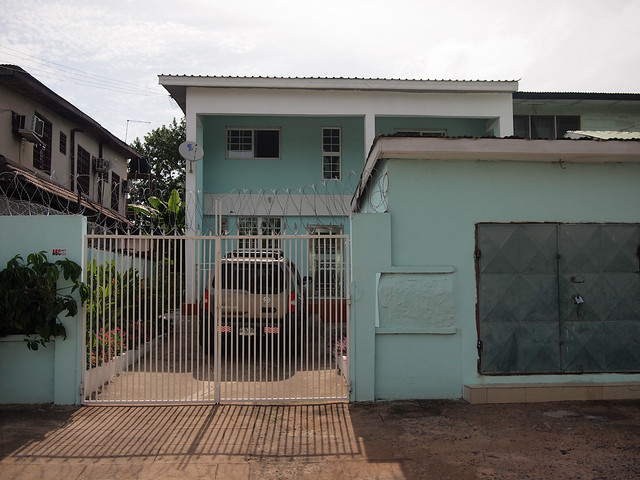 |
My home in Accra
|
The first thing one might notice from the photo above is the amount of security surrounding the home. This highlights one key aspect of housing in Accra. It's easy to tell who is middle class or higher by the security surrounding their home. Any home without a gate and barbed wire is vulnerable to break-ins and thus signifies relative poverty. As I wrote in my original post, "
[My] house is gated and the concrete walls surrounding the property are topped with barbed wire and shards of broken glass that were placed before the walls were completely hardened. Oh, and there’s a Rottweiler that lives exclusively outdoors for security purposes. The windows and doors are also backed with metal bars and the front door has 3 locks all moving in different directions."
Interestingly, a home like mine isn't really as cheap as you might expect. Joyce, the owner of the home and my host for the summer, explained that her 4 bed, 3 bath house would sell for more than $300,000 easily, and if she wanted to, she could even rent it for more than $3,000/month! The home was certainly nice on the inside and was convenient to the downtown area. That said, it also bordered one of Accra's major slums, which brought the price down.
Singapore
The housing situation in Singapore is nothing short of fascinating. To appropriately discuss Singaporean housing, one needs to first make clear the major distinction between Singapore's massive public housing units (HDBs) and the more traditional private housing market. HDB stands for Housing and Development Board, the government unit tasked with privating public housing for the majority of Singaporean locals. HDBs differ from public housing in other countries because their is no stigma of poverty associated with living in one. Rather, the cost of housing in Singapore is so astronomically high that even a small, basic HDB unit requires an individual to earn near or above the poverty line.
Where the numbers really get interesting is in the private housing market. Prepare to be blown away.
 |
The apartment complex I stayed in while visiting Singapore
|
What would you expect the cost of a relatively nice, but relatively small high-rise apartment to cost in "suburban" Singapore? I put quotes around suburban because Singapore is really one endless metropolis. I'm referring to an area that requires a 15 or 20 minute drive to reach the downtown area.
Here's your answer as written in my original post: "Monthly rent for a reasonably nice apartment runs between $10-12,000. Houses can move closer to $25-30,000 in nicer areas." This obviously leaves Ghanaian housing looking dirt cheap. Bear in mind that Singapore was recently named the worst most expensive city, in no small part because of its housing prices (Read: lots of people, strong government presence, tiny amount of space).
2. Cleanliness
Ghana
I challenge you to look past any and all generalizations you may have formed about African living conditions before reading further.....Now that you've done that, I must unfortunately confess that, when it comes to cleanliness, Ghana has some serious problems.
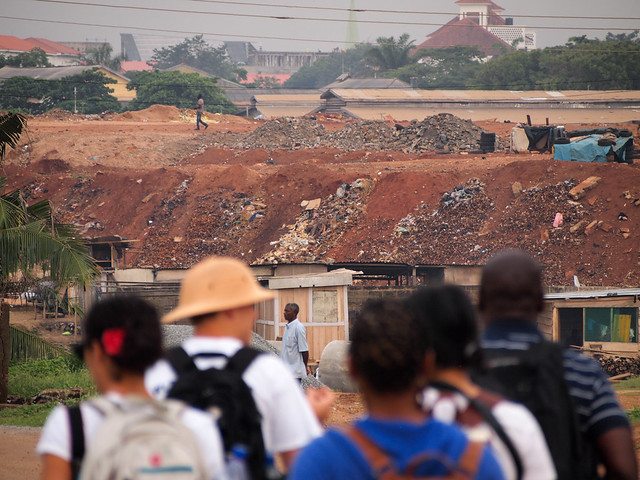 |
This is within a few minutes walking distance of our hotel, one of the nicest in the city.
|
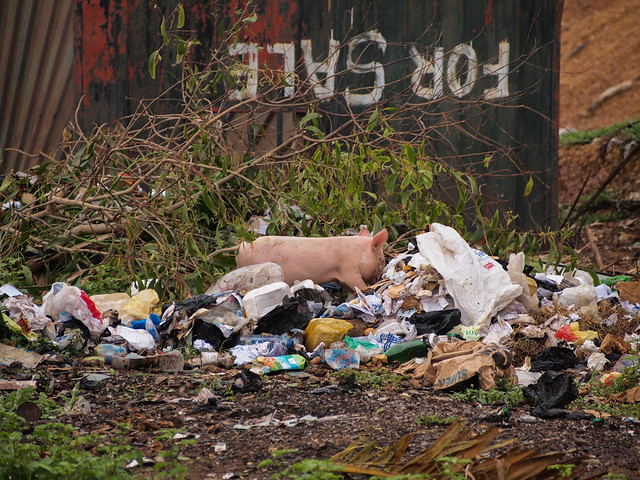 |
| Food isn't just hard to come by for people it seems. On the other hand, it might not be uncommon to see a pig do this in the U.S., either. |
|
I remember the smell of my morning commute. As I stepped outside my door I was greeted by the rancid smell of hot waste - human and otherwise. Streets in Ghana are lined on both sides with open drainage ditches. Unfortunately, those who are less fortunate (or even simply less educated) use them as bathrooms. The abundance of farm animals living remarkably close to the city certainly contributed to the issue as well. Ghana's waste issues can be attributed to three key factors: education, poverty, and government planning. Obviously these three factors are highly interconnected. There is no central water plumbing system anywhere in Ghana. Toilets are built over holes in the ground and, once they fill up, people resort to using the bathroom in the streets. A lack of understanding about the impact of littering explains the horrific amount of trash that lines the roads and fills the ditches all over the country.
Singapore
Wow, prepare for a seriously different situation. Singapore is often heralded as the "cleanest city in the world," infamously known for its anti gum-chewing laws. Here's an excerpt from one of my original posts, written on August 25th, 2012. "It's amazing, really, how a place so crowded and busy can be so clean. Littering is fined heavily in Singapore, but the reality is that it's a cultural thing. The fine is $500 for littering, but the U.S. has pretty hefty fines for littering too, and from what I understand there really is no one there to enforce the littering laws of Singapore anyway. Even so, if a piece of trash falls to the ground, you're sure to see someone bending down to pick it up right away. That's a refreshing sight."
Whether walking or driving through Singapore, there is something strangely serene, yet almost bland, about the city. Everything is in perfect order it seems, reminding me eerily of the setting of The Truman Show. Here's another appropriate excerpt from that August post: " Facts and figures aside, the country is beautiful. There is no such thing as a pothole, and despite the skyscraping housing developments jamming as many people as possible into what little space there is, there is no shortage of "green" here. And I'm not talking about money this time - I mean plants and trees lining every road and building, keeping with the city's pride regarding its cleanliness."
 |
| One of the busiest spots in Singapore and not an ounce of trash in the river. |
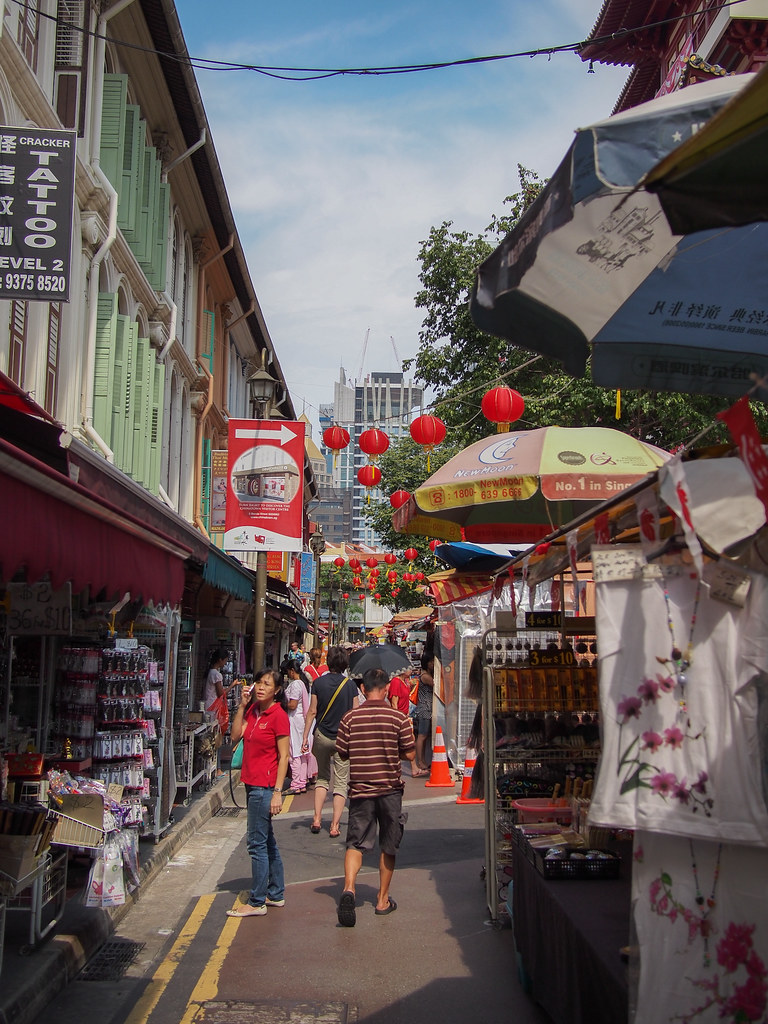 |
| Even this high-traffic market street maintains a trash-free appearance. |
3. Transportation and associated costs
Ghana
As you may recall from my introductory quote, trotros take the cake as the most dangerous, inexpensive, and entertaining/insane form of transportation in Ghana (if not the world). While I'd like to say I embraced the experience day in and day out, my commute lent itself to a more taxi-centric approach. While hopping in a taxi every morning in Boston might empty one's wallet quickly, the ridiculously low taxi prices in Ghana provide insight into two interesting aspects of the Ghanaian economy. The first is negotiation. If you end up paying 70% of what the driver initially asked for, you've failed. My white skin left me facing stiffer than normal prices, but with more than a month of daily price negotiations under my belt, I left the country proud of my ability to negotiate a 5 cedi fare in the morning. That amounts to about $2.80 for a 20 minute ride at peak times, if you're wondering. This is the second aspect of the economy that taxi prices exemplify. Transportation throughout the country is astonishingly, ridiculously inexpensive IF you don't mind having someone ELSE drive you. Buy your own car and you'll suffer some extremely high import duties and be forced to pay high gas prices. My advice? Let the taxi driver bear the brunt of high gas prices and pay the $2 to have him drive you where you want to go. The roads are pothole ridden and overrun with traffic for most of the day anyway, so its not as if there's much incentive to get behind the wheel.
 |
| One of the aforementioned trotros. Judging by the amount of gear it's carrying, this one's likely inbound from well outside the city. |
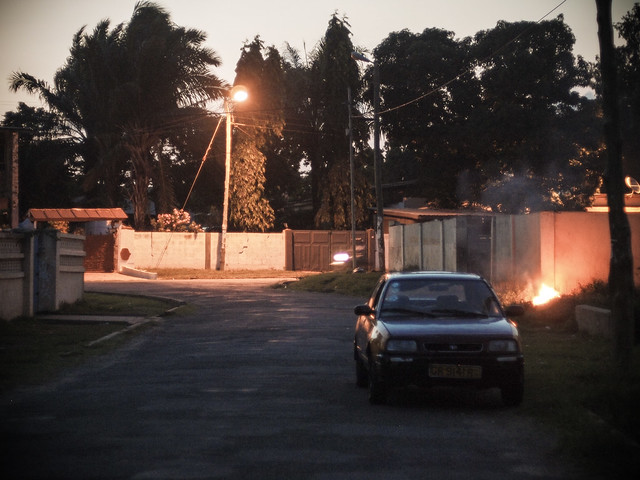 |
Our street at dusk. You can see the fire on the right.
Singapore
Housing prices in Singapore may be absurdly high, but it is my humble opinion that transportation costs are even more astounding. Surely this was the factor that put Singapore above Tokyo, London, and Copenhagen as the world's priciest place to live. You see, the Singaporean government has taken a unique approach to driving in the country. The country is no democracy, and the government has declared it a privilege, not a right to drive. What exactly does this mean in practice you might ask. Essentially, the government has established an auction style permit system in which there are only a limited number of car registration permits available each year. As demand increases, the prices do too. The prices continue to rise until each registration permit has been sold at the highest possible price. In 2013, the permit just to put a car on the road cost $65,000 USD!!!
Here are some interesting figures from my original post on the issue: " The cost of registering a single vehicle: Minimum of $65,000 (registration lasts for 10 years)
Then, one must pay import taxes at around 100% of the vehicle's cost.
The result? A Honda Odyssey becomes a $160,000 car. An Audi S5? $275,000
The prices go up with increases in engine size, too, so Ferrari's flirt with a $1,000,000 price tag. And despite all of this, not a minute of driving goes by without seeing a Lamborgini, Maserati, or some other exotic ride, and Mercedes and Audi are more common than Toyota and Hyundai (well, not including taxis)." This may come as no surprise when one realizes that Singapore is the world's wealthiest nation per capita, with 17% of its resident population being millionaires.
With driving costs being so unbelievably high, Singapore would face a serious problem if it weren't for its incredibly efficient and reasonably priced subway system - the MRT. It is quite literally newsworthy if a train arrives more than a minute off-schedule and, as expected, the trains and stations are impeccably clean and well-maintained.
Conclusions
In a sense, Ghana and Singapore represent opposite extremities when it comes to successful infrastructural development. However, the success of Singapore has not come without limitations, evidenced by the need for heavy government involvement (and in return, high taxes) due to the pricing crisis surrounding vehicles and housing. Ultimately, the country has recognized that drastic measures are necessary to manage the country's large population and booming economy within such a small space. A lack of corruption and advanced education system has made this possible. Ghana, on the other hand, suffers from a severe lack of government involvement in the country's infrastructure. The result is a rather embarrassing waste issue, poverty-driven crime which has lead to increased housing prices in safer areas (and severe dips in unsafe areas without proper security), and a desperate workforce willing to drive you where you need to go for less than it would cost for you to get there on your own.
|
|








No comments:
Post a Comment